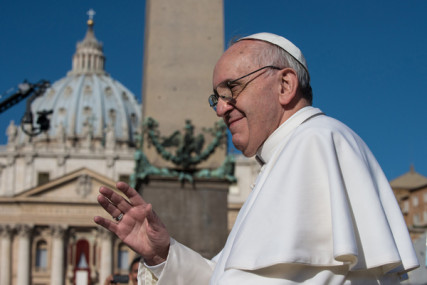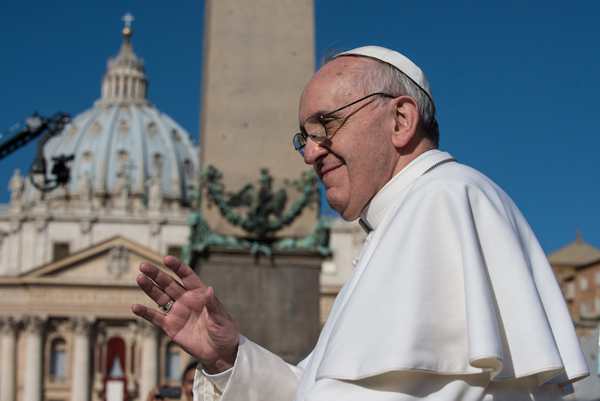I was pitching a story to a philanthropy reporter about an innovative product that a nonprofit was launching. When I finished explaining how it would transform the field, with little overhead and an emphasis on data-driven results, the writer smiled, and he said, “That’s a great story, Mike, but it’s not news.”

Pope Francis waves from the pope-mobile during his inauguration Mass at St. Peter’s Square on Tuesday (March 19) at the Vatican. RNS photo by Andrea Sabbadini
News, the reporter explained, is something that happens outside the ordinary and everyday. A nonprofit organization using funds to do its job is what the public expects. So while the story I pitched was feel-good, it wasn’t news. Scandal, war, violence, and other misery, he said, are unexpected, outside the ordinary, and thus newsworthy.
It was with this lesson in mind when I read Pope Francis’s words this weekend, when he told a crowd of 200,000 that, according to Reuters,
it breaks my heart to say it, finding a homeless person who has died of cold, is not news. Today, the news is scandals, that is news, but the many children who don’t have food – that’s not news. This is grave. We can’t rest easy while things are this way.
Pope Francis’s idea of news fits squarely within the rubric setup by the reporter above. Hearing of a homeless person perishing in the winter or of children going hungry isn’t outside the norm for most people, so it’s not newsworthy. They’re not uncommon events, sadly, and, while perhaps moving, they don’t make their way into most of the media we consume.
As a result, I wonder how, if at all, the suffering experienced by so many each day shapes our politics, actions, and worldviews, especially when it doesn’t enter our consciousness through media. For many, even horrible acts of war in certain regions of the world is expected. So the atrocities in Syria and the ongoing violence in Iraq and Afghanistan don’t stand out as particularly newsworthy. It’s simply, sadly, what we expect.
When the Boston Marathon was bombed last month, some expressed shock and anger, but then questioned why this particular act of violence garnered round-the-clock media coverage when other, just as vicious acts, did not. I thought back to my conversation with the philanthropy writer and put the Boston Marathon attack into that frame. The marathon is run annually without any major incident, so the explosion of two bombs near the finish line of a major sporting event is certainly unexpected and thus news.
Pope Francis isn’t lamenting, like so many other church leaders, that the media covers scandal. Instead, he is expressing disappointment that despite our society’s wealth and technology, we’re unable to create a world where starving children and the untimely death of the homeless are outside the expected. The definition of news, Francis seems to say, doesn’t need to change. Rather, he says, society must transform itself so that even what might now be called mundane suffering becomes newsworthy in itself.





